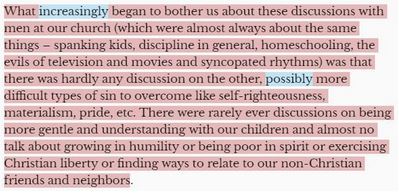Some select quotes I found helpful. In no way do I agree with everything in the book (it’s fairly liberal for my standards), but I did find some good common sense about preaching that a lot of people won’t say (or at least I haven’t heard say).
– Edgar N. Jackson, A Psychology for Preaching (San Francisco: Harper & Row, 1961).
PREACHING IS IN SOME SENSE AUTOBIOGRAPHICAL
Art forms are characterized by highly individualized modes of expression, so the artful presentation of ideas through preaching is strongly tinged by the preacher’s personal qualities. It could safely be said that all preaching is autobiographical… (pp. xxi-xxii).
IT IS HARD TO BE INTERESTING EVERY WEEK
…The necessity of trying to be inspiring on a week to week basis calls for all the ingenuity that a preacher can develop (p. 18).
GRAB THEIR ATTENTION OFTEN
[Quoting a study:] It has been estimated that a class listening to a teacher, an employee listening to his boss, or an audience listening to a lecture has serious lapses of attention ever seven minutes. The expert speaker jerks attention back by telling a story, making a demonstration, or doing something unusual about every five minutes. Interest, action or noise will renew attention (p. 19).
NO PREACHER HAS EARNED THE RIGHT TO BE UNINTERESTING
Too often a man who has won the hearts of his people as a pastor seems to feel that he has earned the right to be a careless craftsman in the pulpit. No one ever earns the right to be uninteresting in the pulpit (p. 20).
JESUS ALWAYS ELICITED A RESPONSE
We have only fragments of [Jesus’] sermons, but we note that again and again there was an immediate and strong response to what he said. The listeners had been mentally engaged. They questioned him. They questioned themselves. They reacted. ‘They rose up, and thrust him out of the city.’ Any way we look at it, we must admit there are very few modern preachers who stimulate so vigorous a response. We may be sure Jesus spent little time sawing sawdust. He ripped into the real problems of people and his age. He generated real participation and response (pp. 29-30).
DON’T TRY TO FUNNY, BUT DON’T AVOID BEING FUNNY
[Quoting Charles Brown:] it is not well for a minister to go out of his way six inches to make a joke. But when some unexpected turn comes to him naturally in the treatment of a great truth, he is unwise to turn aside in order to avoid it (p. 36).
ALL OF LIFE IS SERMON PREP
In one sense the whole life of a preacher is an act of preparation for that moment when he stands in the pulpit (p. 36).
LEARN TO SEE CHRIST EVERYWHERE
It is a psychological principle that we see what we want to see or are trained to see. Sight is a learned art. At an accident near our home recently, I aw this principle in action. The physician who arrived saw the injured persons and their needs because that was what he had been trained to see. The state policeman saw the relevant facts about the vehicles and their relation to each other. That was his special training. A maiden lady, who happened to be near by, saw blood and fainted…The preacher who has developed the habit of looking or new and fresh material that is actively related to the interests of his people will begin to see it cropping up here and there where he had not suspected it before (pp. 37-38).
LISTEN TO WHAT YOU SHOULD LISTEN TO; DON’T LISTEN TO WHAT YOU SHOULDN’T; SELECTIVE HEARING IS REAL
People who live near a railroad get so they seldom hear the trains. persons who live near the town clock may be kept awake by it when they first move there, but after a time they learn a habit of exclusive listening. They hear what they want to hear. This is also true of the preacher (p. 38).
THE END OF THE SERMON IS IMPORTANT FOR SUSTAINED ATTENTION
Even the end of a sermon can be important in sustaining attention; the way the preacher ends his sermon can make the listener want to hear what he has to say at another time (pp. 44-45).
KNOW WHAT YOU’RE DOING AND HOW IT’S BEING DONE; COMFORT THE AFFLICTED, AFFLICT THE COMFORTABLE
…Because congregations tend to e made up of more than one type of personality it may be important for the preacher to employ a change of pace that will at one time ‘Comfort the afflicted’ and at other times ‘Afflict the comfortable.’ yet even here it is important to have some idea of what is being done, how it is being achieved, and what the effect is upon those for whom the message is not especially relevant (p. 54).
TRUTH THROUGH PERSONALITY
This concept of preaching stresses the role of the preacher as the creator in the employment of an art form. His own personality is then inseparably bound up with what is communicated (p. 61).
HELP OTHERS SEE WHAT YOU HAVE SEEN
[Jesus] indicated that his disciples were custodians of the privilege to help others ‘to see those things that you see…and to hear those things that you hear’ (p. 67).
LITERATURE HELPS US UNDERSTAND PEOPLE
Definite supplemental sources of aid in the developing of the pastor’s art of ‘seeing people’ are available to all. Invariably, the masters of understanding have been immersed in the great literature of the past. Jesus had at his disposal the books of poetry, law and prophesy of the Jewish tradition. Paul knew not only the Jewish literature but was conversant with the literature of the Graeco-Roman world as well (pp. 68-69).
JESUS PREACHED SIMPLY
[Jesus] was simple in his presentation. No one from the child to the scholar could be confused by what he said. he used stories that were related to the experience of his hearers, and each story had one main point that stood out too clearly to be mistaken (p. 162).
SNEAK-ATTACK
The timid trout is not pulled from the stream by loud noise and by flailing the water. Rather, it responds to the quiet descending of the unsuspected fly (p. 168).
HAVE ONE MAIN POINT
The sermon must drive with all power toward one point. It must have a theme, a center of concentration and a point of focus. There are many ways of presenting a theme (p. 185).
LEAVE OUT WHAT DOESN’T NEED TO BE THERE
Every part [of the sermon] must serve a purpose, nothing must be there which is not needed, and nothing should be omitted which is required (pp. 186-187).




